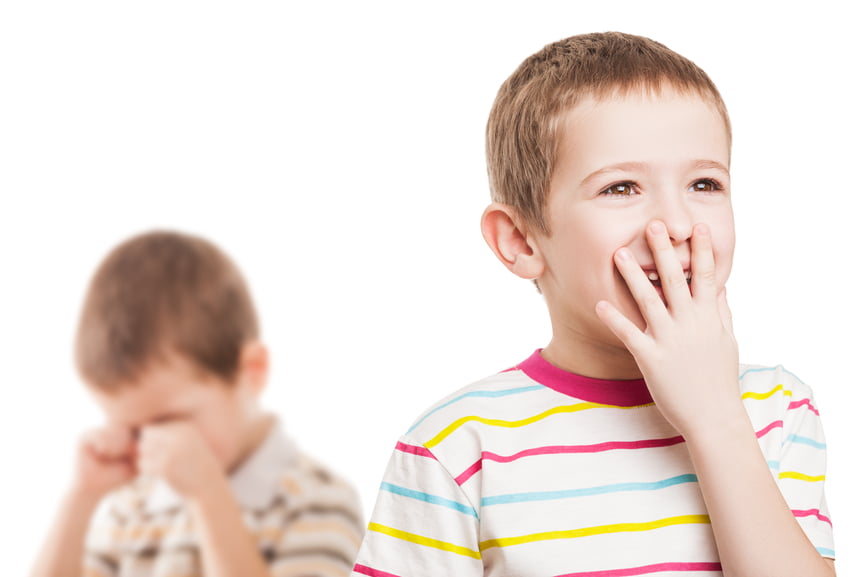They say there is no pleasure greater than the one that is derived from another person’s misfortune, but at what age do we start developing and expressing this complex emotion?
Until now, researchers believed that children didn’t develop such sophisticated emotions until the age of seven, but a new study conducted at the University of Haifa found evidence of ‘schadenfreude,’ the German word describing the emotion, in children as young as two. “The study strengthened the perception that schadenfreude is an evolutionary mechanism that develops within us as we cope with situations of inequality,” said Prof. Simone G. Shamay-Tsoory, who led the study.
Schadenfreude is our evolutionary way of coping with inequality
In German ‘schadenfreude’ literally means deriving pleasure from the misfortunes of others, and it can be rooted in jealousy, competitiveness, or sometimes even hatred. According to one theory, schadenfreude is an evolutionary mechanism that develops as a result of competition over limited resources, for example, the struggle between two siblings over their parents’ attention. This mechanism, which develops at an early age, turns later on into a mechanism that enables us to feel pleasure at another’s misfortune, even when there is no competition for resources.
SEE ALSO: Computer Program As Effective As Drugs For Children With Anxiety
Though it was believed that children under the age of seven were not emotionally developed enough to have feelings of schadenfreude, Shamay-Tsoory and her team thought that they could prove that such feelings surface much earlier, at the ages of two to three. To do this, the researchers set up 35 separate groups that included a mother, her child, and a friend of the child who is the same age. The groups were subjected to two situations.

The first was an “equal” situation, in which the mother encouraged the children to play together, ignored them for two minutes, and then began to read a book aloud to herself for two minutes. After those two minutes, the mother was told to take a glass of water that was on the table and pour it by “accident” on the book. In the second, “unequal” situation, after the first two minutes the mother took the child that wasn’t hers on her lap and began reading the book aloud to him or her. Here, too, after two minutes, the mother spilled the cup of water on the book.
The researchers found that when the unequal situation was brought to an end, the mother’s own child showed visible signs of happiness, as expressed by jumping up and down, clapping hands, or rolling on the floor. By contrast, when the water was spilled while the mother was reading the book to herself, there were no similar reactions. According to the researchers, the “misfortune” that made the children happy was the fact that their peer had stopped hearing the story, which strengthens the theory that schadenfreude is a social development that is a reaction to inequality.
Sign up for our free weekly newsletter
SubscribeJealousy is still stronger than schadenfreude
During the study the researchers also found evidence of jealousy that expressed itself by children trying to force themselves between their mother and the book, or playing with their mother’s hair while the mother was reading the book to their friend. These expressions were stronger than the expressions of schadenfreude, which upholds the findings of previous studies that show jealousy is a stronger emotion than schadenfreude.
SEE ALSO: Spider-Man Window Cleaners Surprise Children’s Hospital On Purim
Apparently, the emotion of schadenfreude is embedded in children far earlier than previously thought. “Social comparisons, in which we compare what we have to what others have, as well as emotions of justice, develop at a very early age and constitute positive evolutionary mechanisms to cope with inequitable situations,” said Prof. Shamay-Tsoory. “Because social-comparison reactions are linked to character traits like self-esteem and altruism, it’s possible that people who think less of themselves are more likely to suffer from feelings of schadenfreude.”
This study was conducted by Prof. Shamay-Tsoory of the University of Haifa’s Psychology Department, along with Dorin Ahronberg-Kirschenbaum of the University of Haifa’s School of Education, and Nirit Bauminger-Zviely of Bar Ilan University.
Photo: Schadenfreude
Related posts

Israeli Medical Technologies That Could Change The World

Harnessing Our Own Bodies For Side Effect-Free Weight Loss

Missing Protein Could Unlock Treatment For Aggressive Lung Cancer




Facebook comments